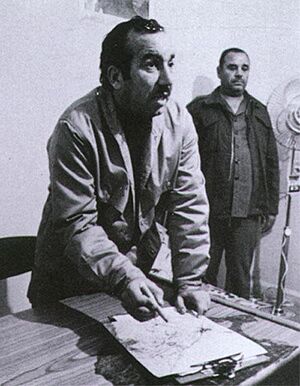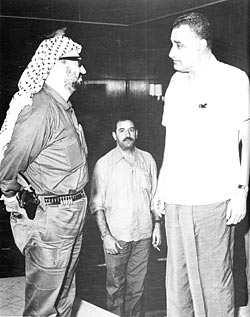Khalil al-Wazir facts for kids
Quick facts for kids
Khalil al-Wazir
|
|
|---|---|

Khalil al-Wazir strategizing
|
|
| Nickname(s) | Abu Jihad |
| Born | 10 October 1935 Ramla, British Mandate of Palestine |
| Died | 16 April 1988 (aged 52) Tunis, Tunisia |
| Buried |
Al Yarmuk camp, Syria
|
| Allegiance | Fatah/Palestine Liberation Organization |
| Service/ |
Al-Assifa |
| Rank | Commander |
| Battles/wars |
|
| Relations | Intissar al-Wazir (wife) |
Khalil Ibrahim al-Wazir (also known by his nickname Abu Jihad, meaning "Jihad's Father"; born October 10, 1935 – died April 16, 1988) was an important Palestinian leader. He helped start the Palestinian group called Fatah. He was a close helper to Yasser Arafat, who was the leader of the Palestine Liberation Organization (PLO). Al-Wazir had a big role in Fatah's military actions. He eventually became the commander of Fatah's armed group, al-Assifa.
Al-Wazir became a refugee when his family had to leave their home in Ramla during the 1948 Arab–Israeli War. He then started leading a small group of Palestinian fighters in the Gaza Strip. In the early 1960s, he made connections for Fatah with leaders from other countries. He opened Fatah's first office in Algeria. He also played a key role in the 1970–71 Black September clashes in Jordan. He helped Palestinian fighters who were surrounded by supplying them with weapons. After the PLO was defeated by the Jordanian Army, al-Wazir moved to Lebanon with the PLO.
Before and during Israel's 1982 invasion of Lebanon, al-Wazir planned many attacks inside Israel. These attacks were aimed at both civilian and military targets. He also helped prepare Beirut's defense against the Israeli forces. However, the Israeli military won, and al-Wazir had to leave Lebanon with the other Fatah leaders. He lived in Amman for two years, then moved to Tunis in 1986. From Tunis, he began to organize youth groups in the Palestinian territories. These groups later became a big part of the Palestinian forces in the First Intifada. Sadly, he was killed before he could lead this uprising. On April 16, 1988, Israeli commandos assassinated him at his home in Tunis.
Contents
Early Life and Beginnings
Khalil al-Wazir was born in 1935 in the city of Ramla, which was then part of Mandatory Palestine under British rule. His father worked as a grocer. In July 1948, al-Wazir and his family were forced to leave their home. This happened when Israel took control of the area during the 1948 Arab-Israeli War. They settled in the Bureij refugee camp in the Gaza Strip. There, al-Wazir went to a secondary school. While in high school, he started organizing a small group of fighters. They would bother Israeli military posts near the Gaza Strip.
In 1954, he met Yasser Arafat in Gaza. Al-Wazir later became Arafat's trusted helper. During his time in Gaza, al-Wazir joined the Muslim Brotherhood. He was briefly put in prison for this because the group was not allowed in Egypt. In 1956, after he was released, he got military training in Cairo. He also studied engineering at the University of Alexandria, but he did not finish his degree. Al-Wazir was arrested again in 1957 for leading raids against Israel. He was then sent away to Saudi Arabia, where he worked as a schoolteacher. He continued teaching after moving to Kuwait in 1959.
Starting Fatah
Al-Wazir used his time in Kuwait to get closer to Arafat and other Palestinians he had met in Egypt. He and his friends started Fatah. This was a Palestinian group that aimed to fight for Palestinian rights. They founded Fatah between 1959 and 1960. Al-Wazir moved to Beirut because he was in charge of editing Fatah's new magazine. The magazine was called Falastinuna, Nida' Al Hayat ("Our Palestine, the Call to Life"). Arafat and Al-Wazir started this magazine in November 1959.
Al-Wazir settled in Algeria in 1962. This happened after Fatah leaders, including Arafat, were invited there by the Algerian President. Al-Wazir stayed in Algeria and opened a Fatah office. He also set up a military training camp in Algiers. In 1964, he went with an Algerian-Fatah group to Beijing. During this visit, he shared Fatah's ideas with leaders of China. This started a good relationship between Fatah and China. He also visited other countries in East Asia, making connections with North Korea and the Viet Cong. Because of his fighting experience and contacts for weapons, he was given the job of finding and training fighters. This led to the creation of Fatah's armed group, al-Assifa (the Storm).
Fatah's Growth in Syria
Al-Wazir and the Fatah leaders moved to Damascus, Syria in 1965. They wanted to use the large number of Palestinian fighters there. After Arab countries lost the Six-Day War in 1967, other Palestinian groups lost their power. This made Fatah the most important group in the Palestine Liberation Organization (PLO). Fatah gained many seats in the Palestinian National Council (PNC). This made al-Wazir's position stronger.
During the Battle of Karameh in March 1968, al-Wazir and Salah Khalaf led Fatah fighters against the Israeli Defense Forces (IDF). This battle showed his skills as a military planner. Because of this, he took command of al-Assifa. He also got important positions in the PNC and the PLO's military council. He was put in charge of planning military actions in the Palestinian territories and Israel.
Conflicts and Exile
During the Black September clashes in Jordan, al-Wazir sent weapons and help to Palestinian forces. These forces were surrounded in Jerash and Ajlun. But Jordan won the conflict. After Arafat and thousands of Fatah fighters moved to Lebanon, al-Wazir helped make an agreement. This agreement was between King Hussein and the PLO. Then, al-Wazir and other PLO leaders moved to Beirut.
Al-Wazir did not play a big role in the Lebanese Civil War. He mainly focused on making the Lebanese National Movement stronger. This group was the PLO's main ally.
While in Lebanon, al-Wazir was in charge of planning important operations. He was involved in planning attacks inside Israel. These included the Savoy Hotel attack in 1975 and the Coastal Road massacre in 1978.
When Israel surrounded Beirut in 1982, al-Wazir thought the PLO should leave Beirut. Even so, al-Wazir and his helper Abu al-Walid planned Beirut's defense. They helped lead PLO forces against the IDF. The PLO forces were defeated and had to leave Lebanon. Most of the leaders moved to Tunis. Al-Wazir went to Jordan for a while before moving to Tunis.
Organizing in the West Bank and Gaza Strip
After the Palestinian forces lost badly in Lebanon in 1982, al-Wazir focused on building a strong Fatah presence. He wanted to do this in the Israeli-occupied West Bank and Gaza Strip. In 1982, he started supporting youth groups in these areas. These groups grew and helped start the First Intifada in December 1987. The word Intifada means "shaking off" in Arabic. It is used to describe an uprising or revolt.
The Intifada began as an uprising of Palestinian youth. They were protesting against the Israeli control of the West Bank and Gaza Strip. Al-Wazir was sent by Arafat to be in charge of these territories for the PLO. He knew a lot about the local conditions in the occupied territories. He seemed to know "every village, school, and large family in Gaza and the West Bank." He gave the uprising money and supplies. Because of this, he became its "brain in exile." Al-Wazir activated all the groups he had set up in the territories. He wanted to support the stone-throwers who were the main part of the Palestinian revolt. He also used this chance to make changes to the PLO.
Assassination
Al-Wazir was assassinated at his home in Tunis on April 16, 1988. He was 52 years old. The Israeli government decided to kill him after the First Intifada began. Israel accused al-Wazir of making the Intifada more violent. The Mothers' Bus attack in March 1988 was a key reason. This was a bus hijacking that Israel believed al-Wazir organized. Three Israeli civilians were killed in that attack.
The assassination was planned by the Mossad, Israel's intelligence agency. It was called Operation Introductory Lesson. Mossad agents had watched his home and tapped his phone lines for over a year. The plan involved Israeli commandos landing on the Tunisian coast. Then, Mossad agents would drive them to his home to kill him. Ehud Barak, a high-ranking Israeli military officer, was in charge of the operation.
On April 14, six Mossad agents arrived in Tunis. They rented cars to transport the commandos. Other agents watched al-Wazir's home to make sure he was there. At the same time, Israeli Navy ships sailed towards Tunisia. They carried 33 commandos and equipment. The Israeli Air Force provided air cover.
On April 15, commandos landed on the beach in rubber boats. They met the Mossad drivers and changed into civilian clothes. They would enter al-Wazir's neighborhood disguised as ordinary people. Al-Wazir arrived home just after midnight. Israeli intelligence was listening to his phone calls. They learned he had a flight booked for later that morning. They decided to act immediately.
The commando team drove to al-Wazir's home. They confirmed he was inside by making a phone call to his house. Three Arabic-speaking soldiers listened to his voice to confirm it was him. After getting final approval, the commandos moved in. They killed a bodyguard outside the house. Then they entered the home. They killed another bodyguard and the family's gardener in the basement. Al-Wazir was found upstairs and shot many times. The entire raid took only five minutes.
The commandos then went back to the beach and returned to their boats. Local police were sent in the wrong direction by false reports from Mossad agents.
After his assassination, riots broke out in the Palestinian territories. Many Palestinians were killed. He was buried in the Yarmouk refugee camp in Damascus on April 21. Arafat led the funeral procession.
In 2012, Israel unofficially confirmed its role in his assassination. This happened when an interview with Nahum Lev, one of the commanders, was allowed to be published. The United States Department of State called his killing an "act of political assassination." The United Nations Security Council also passed a resolution condemning the attack on Tunisia's independence.
Family Life
Al-Wazir married his cousin Intissar al-Wazir in 1962. They had five children together: three sons named Jihad, Bassem, and Nidal, and two daughters named Iman and Hanan. After peace agreements were made between Israel and the PLO, Intissar and her children returned to Gaza. In 1996, she became the first female minister in the Palestinian National Authority. Intissar later became the head of a fund that helps families of Palestinians killed or wounded in conflicts. His son Jihad al-Wazir used to be the head of the Palestinian Monetary Authority. He now works for the International Monetary Fund.
In 2014, the Palestinian Authority named a forest in the West Bank the Martyr Khalil Al-Wazir Forest in his honor.
See also
- List of Fatah members
Images for kids
-
Yasser Arafat and Abu Jihad meet Gamal Abdel Nasser in Cairo in 1970.
 | May Edward Chinn |
 | Rebecca Cole |
 | Alexa Canady |
 | Dorothy Lavinia Brown |



